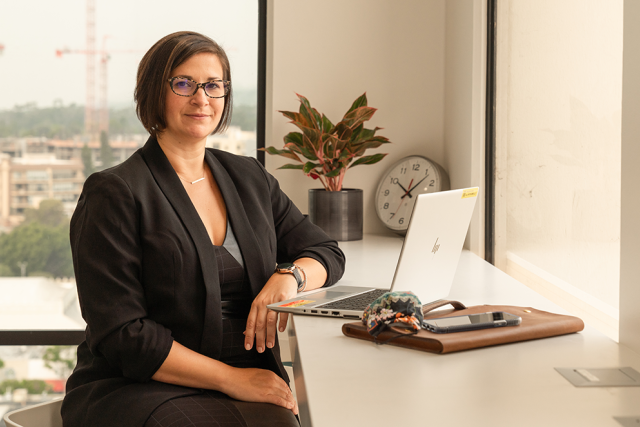UCLA Health’s new director of Cancer Genetic Counseling, Mariana Niell-Swiller, first became interested in her future career when she graduated from college and started working in a genetics diagnostic lab. Niell-Swiller had studied biology, not quite knowing how she would use her degree. But right after college, while working as a lab tech, something piqued Niell-Swiller’s interest. She wondered what happened to those genetic test results after the laboratory reported them out.
Fortunately for her, she was able to find out firsthand. As it turns out, the physician who ran the laboratory also ran a clinic for neurogenetic diseases.
“I was able to shadow the physician and her genetic counselor in the clinic they operated,” said Niell-Swiller. “That’s where I learned about this career. I went back to school to train for it where it became clear that this was the right path for me.”
Niell-Swiller had a personal experience with cancer that shaped her understanding of how disease can impact whole families. A large part of cancer genetic counseling is to help families understand risk and to empower them to take appropriate action to manage those risks.
At UCLA, there are six genetic counselors dedicated to the care of adult patients with questions about hereditary cancer risk.
“It is really important to have educated and compassionate counselors who can help you understand how cancer can run in families,” she said.
The work of genetic counselors starts when they meet with people and review their personal and family health history and continues until the patient and family members understand potential cancer risks related to that history. In many cases, genetic counselors also help people navigate the sometimes difficult decision to proceed with genetic testing or not. For cancer patients, genetic testing for inherited mutations in certain genes such as BRCA1 and BRCA2 has become standard of care since these results can determine the potential effectiveness of new targeted therapies.
If a person decides to undergo genetic testing, they give a blood or saliva sample. UCLA Health uses clinical-grade tests that provide in-depth results. When these results come back from the laboratory, the counselor is at the patient’s side to help interpret and apply this complex genetic information. The review of this information ultimately helps patients and their physicians think about the best treatment and prevention options for their specific situation. Genetic counselors are also incredible resources for learning about the impact of results and helping patients share those results with their relatives.
“Gathering genetic information has become a crucial part of what is being referred to as precision health,” said Niell-Swiller. “By understanding the genetic basis of their disease, patients and their physicians can choose a targeted therapy that has been proven to more effectively fight cancer in patients with their specific type of genetic makeup.”
As a major academic medical center, UCLA Health is a leader in precision health. Today, UCLA Health brings together physicians, researchers and educators to provide patients and their families with the best care possible. This care includes individualized genetic counseling from risk assessment to diagnosis and treatment.
In partnership with Beth Karlan, MD, PhD, Niell-Swiller will implement new workflows to reach previously underserved patients and provide broader access to genetic counseling in the cancer population. Dr. Karlan is the director of Cancer Population Genetics at the UCLA Jonsson Comprehensive Cancer Center and has been a champion for increasing access to genetic counseling for cancer patients and their families at UCLA Health.
“We are so pleased that Mariana has joined UCLA Health to help lead and continue to build our genetic counseling services,” said Dr. Karlan. “With her vast knowledge and experience, we will greatly expand genetic counseling at UCLA so that more people can have access to this important information about their health.”
This fall, a new Program in Genetic Counseling commenced at the David Geffen School of Medicine at UCLA. This program will train students how to help patients facing complex choices because of their genetic makeup. Dr. Karlan, Niell-Swiller and UCLA’s team of cancer genetic counselors will be instrumental in training these students in cancer genetic counseling through internships and didactics.
Things to keep in mind
If you are considering genetic testing and counseling services, here are some things to keep in mind according to Niell-Swiller.
- Most cancers are not hereditary. The key is to understand if there is a pattern of cancer in a particular family.
- Consider seeking genetic counseling services if there is a personal or family history of:
- Cancer diagnoses at early ages (for example, colon or breast cancer younger than age 50)
- Multiple close relatives with the same or related cancers
- Multiple generations on the same side of the family affected by cancer
- Multiple cancer diagnoses in one person
- Most insurances will cover genetic counseling and testing. It is always best to check with the insurance carrier before setting up an appointment.
- There are several legal protections currently in place that protect us against genetic discrimination by health insurance and employers. Discuss the details with your genetic counselor at your appointment.
- DNA tests through the mail and conducted at home, known as “direct-to-consumer” tests, do not give the same in-depth results that people can obtain by working with a trained genetic counselor using a clinical-grade test.



